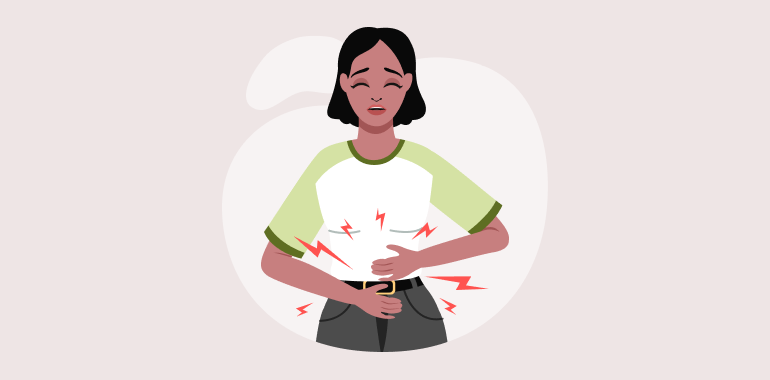Table Of Contents
Fasting on Period: How to Harness the Power During Menstruation
Navigating the intersection of fasting and menstruation can feel challenging, yet many women discover surprising benefits when properly managed. This guide explores how fasting during your period affects your body, the potential benefits, and practical approaches to make it work for you. I’ll share science-backed insights on how fasting while on period might help manage symptoms and even improve your overall well-being.
Key Takeaways: Fasting during your period can reduce inflammation and potentially ease cramps, but requires careful attention to energy levels and nutritional needs. The benefits include improved insulin sensitivity and reduced bloating, while potential drawbacks include increased fatigue. Every woman’s body responds differently, so listening to your body is essential when fasting during menstruation.
Intermittent Fasting and Weight Loss During Your Period
Intermittent fasting involves alternating between eating and fasting periods, allowing your body to tap into stored fat for energy. Many women wonder if continuing their fasting routine during menstruation is effective for weight management. The research, while limited, offers promising insights.
Studies suggest that following a 16:8 fasting protocol (16 hours fasting, 8 hours eating) can improve weight, body fat, and insulin resistance regardless of where you are in your menstrual cycle. Another study examining Ramadan fasting found no significant impact on menstrual cycle regularity or hormone levels in participants.
Your individual experience may vary. Some women report that fasting during their period helps reduce bloating and water retention, while others find it exacerbates symptoms like cramps or headaches. If you’re looking to manage weight during your period, intermittent fasting might be beneficial, but always prioritize how your body responds.

The Science of Fasting During Menstruation
During fasting, your body shifts from using glucose as its primary energy source to burning stored fat. This metabolic switch brings benefits like improved insulin sensitivity and reduced inflammation throughout the body. But how does this interact with the hormonal changes of your menstrual cycle?
Your body’s response to fasting varies throughout your cycle. During the luteal phase (after ovulation and before menstruation), your metabolism naturally favors fat burning, potentially making this time more responsive to fasting benefits. In contrast, during the follicular phase (after menstruation and before ovulation), your body focuses more on carbohydrate metabolism and might be less responsive to fasting.
The hormonal fluctuations during menstruation affect energy metabolism and nutrient utilization. These changes can impact how your body responds to fasting and might influence appetite, energy levels, and mood. Understanding this relationship helps explain why some women find fasting helpful during certain phases of their cycle while others prefer to adjust their approach.
Water Fasting During Periods: Is It Safe?
Water fasting during menstruation, where you consume only water for a set period, represents one of the more intensive fasting approaches. This method raises important safety considerations, especially during your period when nutritional needs may be heightened.
The practice of water fasting during periods might increase the risk of dehydration, electrolyte imbalances, and nutritional deficiencies. Your body loses blood and iron during menstruation, and without proper nutrition, you may experience increased fatigue, dizziness, or weakness.
If you’re determined to try water fasting during your period, consider these safety measures:
- Start with shorter fasting windows (12-16 hours) rather than multi-day water fasts
- Stay extremely well-hydrated and consider adding electrolytes to your water
- Monitor your energy levels and symptoms closely
- Break your fast immediately if you experience severe symptoms
- Consult with a healthcare provider before attempting can i do water fasting during periods
For most women, gentler fasting approaches like intermittent fasting with a nutritious eating window may prove more sustainable and beneficial during menstruation than strict water fasting.
Should You Continue Fasting When Your Period Starts?
When your period arrives unexpectedly during a fast, deciding whether to continue depends on your fasting type and how your body responds. For intermittent fasting, you might simply adjust your eating window to later in the day. For religious fasting, following your practice’s guidelines for menstruation is appropriate.
Consider these factors when deciding whether to continue fasting during your period:
- Listen to your body. If you experience weakness, dizziness, or unusual fatigue, these signals suggest your body needs nourishment.
- Adjust your fasting schedule. Consider shortening your fasting window or reducing fasting frequency during menstruation to make it more manageable.
- Stay hydrated. Proper hydration becomes even more crucial during your period, especially when fasting.
- Consider your nutritional needs. Your body may require different nutrients during menstruation. Focus on nutrient-dense foods during your eating windows.
Some women discover that fasting alleviates menstrual symptoms, while others find their symptoms worsen. Your personal experience should guide your decision—there’s no one-size-fits-all approach to fasting while on period.
Also, read – Do You Burn More Calories on Your Period
How Fasting Affects Period Cramps and Symptoms
Many women seek relief from monthly period cramps, and fasting has emerged as a potential approach. While scientific evidence remains limited, the connection between fasting and inflammation reduction offers a compelling explanation for why it might help with period pain.
Anecdotal reports indicate that skipping meals around menstruation helps alleviate pain and other symptoms for some women. Studies suggest that fasting reduces inflammation levels in the body, which could explain its potential benefit for period cramps, as inflammation contributes significantly to menstrual pain.
Beyond cramps, fasting might impact other menstrual symptoms:
- Reduced bloating due to decreased food intake and improved gut function
- Stabilized mood through balanced blood sugar levels
- Improved energy levels after the initial adaptation period
- Decreased headache intensity for some women
However, the response varies significantly between individuals. Some women report worsened symptoms when fasting during their period, including increased cramping, headaches, or fatigue. This variation highlights the importance of personal experimentation and listening to your body’s signals.
The Body’s Hormonal Response to Fasting While Menstruating
Your hormonal landscape during menstruation creates a unique environment that interacts with fasting in complex ways. The primary female hormones—estrogen and progesterone—fluctuate throughout your cycle, affecting everything from energy levels to how your body processes nutrients.
During menstruation, both estrogen and progesterone levels are relatively low. Fasting during this time might affect how quickly these hormones return to their normal patterns. For some women, fasting can temporarily lower estrogen levels further, which might reduce inflammation and pain but could also affect energy and mood.
Fasting affects other hormones important during menstruation:
- Insulin sensitivity often improves during fasting, which may help reduce bloating and water retention
- Cortisol (stress hormone) might increase during fasting, potentially intensifying period symptoms if stress levels are already elevated
- Ghrelin (hunger hormone) fluctuations can affect appetite and cravings, which some women find more challenging during menstruation
The hormonal interaction between fasting and menstruation explains why women’s experiences vary so greatly. Your individual hormonal balance, stress levels, and metabolic health all influence how fasting during period affects your body and symptoms.
10 Benefits of Fasting on Your Period
Fasting on your period offers several potential benefits that may improve your menstrual experience and overall health. Here are ten ways fasting on period benefits your body:
Reduced Inflammation and Menstrual Pain
Fasting reduces inflammation throughout the body, which may help alleviate menstrual cramps and pelvic discomfort. The anti-inflammatory effects occur as your body shifts to fat-burning and produces fewer inflammatory compounds.
Improved Insulin Sensitivity
Fasting enhances how your cells respond to insulin, helping regulate blood sugar levels. This improved insulin sensitivity can reduce period-related cravings and mood swings triggered by blood sugar fluctuations.
Weight Management During Hormonal Fluctuations
Many women experience water retention and bloating during menstruation. Fasting can help manage these temporary weight fluctuations by reducing calorie intake and promoting the release of stored water.
Enhanced Gut Health and Digestion
Fasting gives your digestive system a break, allowing it to rest and repair. This can improve overall gut health and reduce digestive discomfort often experienced during menstruation.
Potential Cancer Risk Reduction
Fasting promotes cellular repair processes that may help reduce cancer risk. For women concerned about reproductive cancers, this protective benefit adds another reason to consider fasting.
Mental Clarity and Focus
Many women report improved mental clarity while fasting, which can counteract the brain fog sometimes experienced during menstruation. This improved focus may help maintain productivity during your period.
Reduced Oxidative Stress
Fasting decreases oxidative stress on your cells, protecting them from damage. This cellular protection supports overall health and may contribute to reduced menstrual symptoms over time.
Strengthened Immune Function
Fasting promotes white blood cell production and regeneration, enhancing immune function. A stronger immune system helps protect against infections during menstruation when some women experience increased vulnerability.
Decreased Menstrual Symptom Severity
Many women report that regular fasting leads to less severe menstrual symptoms over time. This improvement may result from the combined effects of reduced inflammation, better hormonal balance, and improved metabolic health.
Heightened Body Awareness
Fasting encourages greater attention to your body’s signals. This increased awareness helps you better understand your menstrual cycle and how different foods and eating patterns affect your symptoms.
Keto and Menstruation: Combining Approaches for Better Results
The ketogenic diet offers specific benefits that can complement fasting during menstruation. This high-fat, low-carb approach creates a metabolic state called ketosis where your body burns fat for fuel instead of carbohydrates. When combined with fasting during period, the keto diet may enhance results and ease menstrual symptoms.
Key benefits of combining keto with fasting during menstruation include:
- Improved hormone balance: The keto diet helps regulate hormone levels, potentially reducing irregular or heavy periods
- Reduced bloating and water retention: The low-carb nature of keto minimizes water retention, a common menstrual complaint
- Stable energy levels: Ketosis provides steady energy, countering period-related fatigue
- Enhanced mood and cognitive function: Keto promotes neurotransmitter production that supports emotional well-being
- Reduced cravings: Ketosis naturally suppresses appetite, helping manage period-related food cravings
Research suggests that following a ketogenic diet may also reduce the risk for polycystic ovarian syndrome (PCOS), which can disrupt regular menstrual cycles. This additional benefit makes keto worth considering for women with menstrual irregularities.
When combining keto with fasting while on period, start gradually. Begin with a standard ketogenic diet before adding intermittent fasting. This approach allows your body to adapt to fat metabolism before introducing fasting periods, reducing the likelihood of side effects during menstruation.
Also, read – Does Intermittent Fasting Affect Your Period?
Potential Side Effects of Fasting During Your Period
While fasting on your period offers potential benefits, it’s important to recognize possible drawbacks. Understanding these side effects helps you make an informed decision about whether fasting while on period is right for you.
Increased Fatigue and Energy Depletion
Menstruation already taxes your energy reserves, and fasting may compound this effect. Your body uses energy to shed the uterine lining, and restricting food intake can lead to deeper fatigue. This energy deficit might manifest as weakness, dizziness, or difficulty concentrating, especially during the first few days of your period when bleeding is typically heaviest.
Hormonal Imbalances and Cycle Changes
Extended or frequent fasting during menstruation can disrupt your hormonal balance. Your body interprets prolonged fasting as a potential stressor, which may trigger hormonal adaptations. Some women experience changes in their cycle length, flow volume, or even missed periods with consistent fasting. These changes signal that your body’s reproductive system is responding to the energy restriction.
Nutritional Deficiencies When Your Body Needs More
During menstruation, your nutritional needs change. Iron requirements increase due to blood loss, and your body needs adequate protein, B vitamins, and minerals to support tissue repair. Fasting restricts your opportunity to replenish these nutrients, potentially leading to deficiencies over time. This nutritional gap may worsen period symptoms and slow recovery.
Most women experience diminished physical ability, poorer concentration, and mood changes when fasting during their period. These effects can interfere with daily activities, exercise performance, and work productivity. If you notice these symptoms becoming severe, consider modifying your approach to fasting during menstruation.

How to Fast Safely During Menstruation: Practical Tips
Fasting safely during your period requires thoughtful planning and attention to your body’s signals. These practical strategies help you maintain the benefits of fasting while supporting your body through menstruation:
- Choose gentler fasting methods: During your period, opt for less restrictive approaches like 12:12 or 14:10 intermittent fasting rather than extended fasts. This provides adequate eating windows to obtain necessary nutrients.
- Prioritize nutrient density: During eating windows, focus on iron-rich foods (leafy greens, red meat), healthy fats (avocado, nuts), and protein sources to replenish what’s lost during menstruation.
- Stay hyper-hydrated: Drink more water than usual during your fasting period to prevent dehydration, which can worsen period symptoms. Consider adding electrolytes to maintain mineral balance.
- Time your fasts strategically: If possible, schedule your eating window when period symptoms like cramps are typically worst. For many women, this means eating during midday and fasting overnight.
- Consider supplementation: Magnesium, iron, and B-complex vitamins may help support your body during fasting on your period. Consult with a healthcare provider about appropriate supplements.
- Reduce intensity gradually: If you’re new to fasting, don’t start during your period. Begin between cycles and gradually adjust as your body adapts to both fasting and menstrual changes.
- Monitor your energy levels: Keep track of how you feel throughout the day. If fatigue becomes severe, consider breaking your fast earlier than planned.
- Adjust physical activity: Lower the intensity of workouts during fasted states while menstruating. Light walking or gentle yoga may be more appropriate than high-intensity training.
Remember that safety should always be your priority when fasting during menstruation. If you experience dizziness, extreme fatigue, or unusual changes in your cycle, consider pausing your fasting practice and consulting with a healthcare provider.
Also, read – Menopause Diet: Foods that Help with Hot Flashes
Listening to Your Body: When to Adjust Your Fasting Schedule
Your body communicates its needs through various signals, especially during menstruation. Learning to recognize and respond to these cues is essential when fasting during your period. Here are important signals to monitor that may indicate you need to adjust your fasting approach:
Physical signals that suggest modifying your fast:
- Unusual dizziness or lightheadedness
- Severe headaches that don’t respond to hydration
- Extreme fatigue beyond normal period tiredness
- Intense nausea or stomach pain
- Heart palpitations or racing heartbeat
- Significantly increased menstrual pain
Emotional and cognitive signals worth noting:
- Heightened irritability or mood swings
- Inability to concentrate
- Overwhelming food obsession or preoccupation
- Anxiety or panic related to food restriction
When these signals appear, consider these adjustment strategies:
- Shorten your fasting window by a few hours
- Take a complete break from fasting during the heaviest days of your period
- Include a small, nutrient-dense snack during your fasting window
- Switch to a modified fast with bone broth or minimal calories
- Focus on hydration with electrolytes to address lightheadedness
Remember that adjusting your fasting schedule isn’t failure—it’s responsive self-care. Your menstrual needs vary month to month, and your fasting approach should be equally flexible. What works during one period might need modification during another, depending on stress levels, sleep quality, and overall health.
Finding Your Personal Balance Between Fasting Benefits and Period Needs
Finding your optimal approach to fasting during menstruation is a personal journey that requires experimentation and self-awareness. Your unique physiology, lifestyle, and menstrual pattern all influence how fasting affects your body during this time.
Start by tracking your menstrual symptoms and fasting experiences across several cycles. Note energy levels, hunger sensations, mood changes, and physical symptoms. This data helps identify patterns and determine which fasting approaches serve you best during different phases of your cycle.
Consider these personalized approaches to balance fasting benefits with period needs:
- Cycle-synced fasting: Adjust fasting intensity throughout your menstrual cycle. For example, practice longer fasts during the follicular phase when energy is typically higher, and shorter fasts or time-restricted eating during menstruation.
- Symptom-based adjustments: Modify fasting based on symptom severity rather than calendar days. On days with minimal symptoms, maintain your usual fasting schedule; on days with intense symptoms, relax your approach.
- Partial-month fasting: Some women find success fasting for three weeks of the month and taking a complete break during menstruation.
- Nutrition-focused intermittent fasting: Maintain time-restricted eating windows but emphasize nutrient density during your period, prioritizing iron-rich foods, healthy fats, and complete proteins.
Remember that your fasting approach should enhance your well-being, not diminish it. The goal is to support your body’s natural processes while gaining the benefits of fasting. If fasting consistently worsens your period experience, consider whether the timing or method needs adjustment, or whether fasting during menstruation is right for you at all.
Conclusion
Fasting on period offers a unique opportunity to tap into your body’s natural rhythms and potentially enhance your menstrual experience. When approached mindfully, intermittent fasting during menstruation may help reduce inflammation, ease cramps, and provide metabolic benefits that support overall well-being.
I’ve found that the key to successful fasting during period lies in flexibility and attentiveness to your body’s signals. What works beautifully during one cycle might need adjustment during another. This responsive approach allows you to harness the benefits while honoring your body’s changing needs.
If you’re curious about trying fasting during your period, start slowly with shorter fasting windows and gradually extend as your body adapts. Pay attention to how different approaches affect your energy, mood, and symptoms. This experimental mindset helps you discover your personal sweet spot where fasting enhances rather than detracts from your period experience.
Remember that fasting is just one tool in your wellness toolkit. Combined with proper nutrition, adequate rest, and stress management, it can contribute to a more comfortable menstrual experience and better overall health. Listen to your body, adjust as needed, and discover how fasting might transform your relationship with your monthly cycle.
Mia Wang is Ph.D. in Nutrition. Passionate about helping others achieve their health goals through evidence-based nutrition and lifestyle solutions.










It’s incredibly helpful to understand the considerations and potential benefits of fasting while on period and drawbacks. This type of diet really reduced my menstrual symptoms.
Hi, Lina👋
That’s awesome to hear! It’s great that you found fasting to help manage your menstrual symptoms.